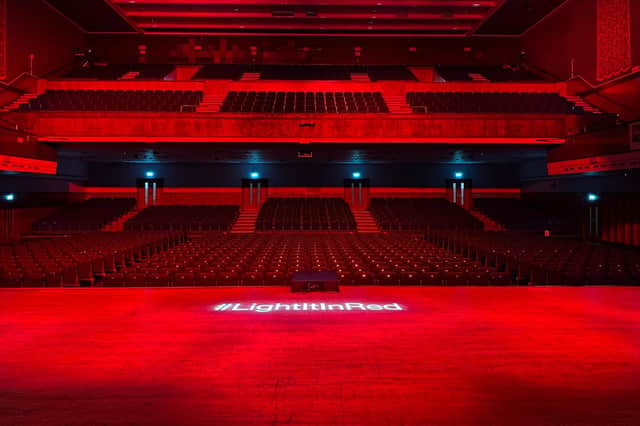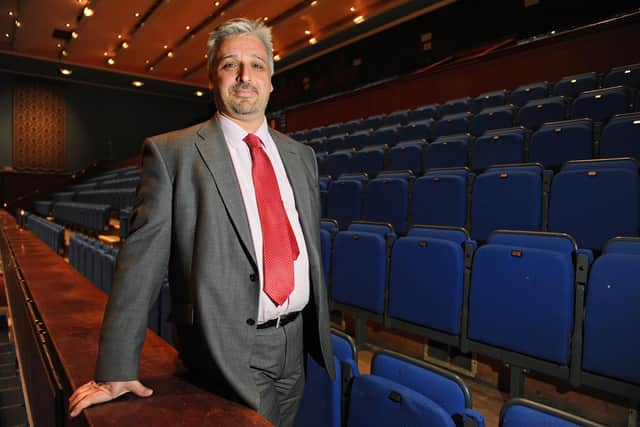Portsmouth Guildhall is ready to come Back With a Bang after lockdown closure


Or howling with laughter at the stand-up’s risque joke.
But last night, the huge hall stood empty as it has done since March when the Covid-19 pandemic forced its closure and we entered lockdown.
However, yesterday it was bathed in red like many other venues across the UK as part of a nationwide initiative – #lightitinred, under the wider #WeMakeEvents campaign. It aims to draw attention to the critical condition of the UK live event and entertainment industry and its need for special government support to see it through to restarting.


Advertisement
Hide AdAdvertisement
Hide AdChief executive of the Guildhall Andy Grays says: ‘It doesn't matter how big you are as an organisation and how wealthy you are, to how small and independent you are – you’re all now fighting for the same cause.
‘It is no longer broken down along what I think of as traditional lines – between commercial sector and subsidised sector, or even London and provincial sectors. Everybody has the same issues.
‘Probably the contention, particularly in the music sector, is that they tend to feel they’re the secondary voice to the theatre sector, which is especially dominated by the West End and therefore has voices like Cameron Mackintosh and Andrew Lloyd Webber, and what they’re saying to government.’
Now though, The Guildhall is forging ahead with plans to once more bring life back to the venue. Earlier this week they announced that ‘The Beat is Back’ as more new shows went on sale than at any time since the lockdown began.
Advertisement
Hide AdAdvertisement
Hide Ad‘However you look at it,’ says Andy, ‘venues are closed, there’s no touring, no productions, and now we’re trying to reopen, albeit in a very limited style.’
And he admits it’s been ‘tremendously sad’ seeing how the industry was forced to shut up shop virtually overnight.
‘It’s a sad thing when you’re used to seeing seats full and you’re suddenly not seeing anything, or a complete drop-off. It’s not what venues are for.
‘There’s a sort of sadness in walking into an empty venue knowing that there’s nothing happening for several weeks or months. You start to get a musty smell which means it’s not being used enough.
Advertisement
Hide AdAdvertisement
Hide Ad‘What we’ve seen with the lockdown and with what’s happened locally and nationally, is that culture is probably valued more than it ever has been as people realise what it means to lose it completely.
‘Like everybody, I like watching things on streaming or YouTube, or whatever you can get your hands on, but there is absolutely nothing like the buzz from a gig or a great piece of theatre. It’s that live thing.’
As members of the Concert Hall Association, the Guildhall has been part of conversations with other similar venues across the whole of the UK.
‘You realise actually that concert halls are a relatively precious breed,’ says Andy. ‘There’s not one in every town or city, and they’re not nearly as common as traditional theatres and music venues.
Advertisement
Hide AdAdvertisement
Hide Ad‘We all have extremely large overheads,’ the Guildhall costs £1.7m a year to run, ‘we’re all singing from the same song sheet and we have the same challenges ahead of us.
‘In some respects, you’re a victim of your own success – if you’re not reliant on Arts Council funding or local authority funding to a high level, but you have a fairly diverse business model, suddenly those income streams are immediately halted, you’re pretty stuck.’
The Arts Council is expected to announce next week which organisations have made successful bids for a slice of £500m from the £1.57bn Cultural Recovery Fund.
‘It’s going to be incredibly competitive and the chance of succeeding is probably no more than one in five, so there’s a lot of us who won’t have that degree of comfort. There’s a question of how those decisions will be made, and there will be some controversy over this, I’m sure.
Advertisement
Hide AdAdvertisement
Hide Ad‘We did put a submission in and I would say it’s a strong submission – we spent as much time as we could on it.
‘We’re very focused on reopening the Guildhall again from January, at a reduced level and building up our business over several months.
‘You’re playing with hundreds if not thousands of organisations, and there’ll be some who’ve asked for a couple of hundred thousand, like we’ve done, to others who’ve asked for almost a million pounds. You’d imagine the bigger organisations, like the National Theatre or Albert Hall will try and max out what they can get.
‘The decision makers have a tough job here and my hope is that even that those which don’t get the money, there’s still more to come in a second tranche.’
Advertisement
Hide AdAdvertisement
Hide AdOne of the problems facing the likes of the Guildhall is that they can’t just reopen the doors and expect the public – and the shows – to magically appear. Awareness needs to be rebuilt, tickets have to be sold and the venues have had to adapt to making themselves ‘Covid-safe.’
‘It’s not like a cinema or pub and restaurant where you can open and people will come back in straight away.’
Andy reckons they already have 30-40 shows on sale, which includes rescheduled shows as well as newly announced shows, which stretch into 2022.
‘The shows prior to next autumn are mostly rescheduled shows, which had probably already sold out or were selling well,
Advertisement
Hide AdAdvertisement
Hide Ad‘Then all of the new stuff is going to be very much reliant in building the public’s confidence in the sector – and that’s absolutely crucial, that the public feel comfortable coming back into a venue, feeling that venue is Covid-secure, and that there’s a certain sense of reasonable normality, that they’re not going to be distracted by all of the mechanisms to get them in to their seats. Once they’re in their seats, they still want to enjoy themselves.’
One new venture for the venue is teaming up with the University of Portsmouth – lectures will be held in its spaces, which will allow them to test out their new safety measures.
‘We’ve got good policy in place – we’ve been practising that, and we’ll be practising it when we have the students coming in from next week onwards. We’ll learn a lot of lessons from how people are routed around the building, and how it works practically for them.
‘We’ve also got some small comedy shows in this autumn which allows us to test the practical side – and generally that’s what happens across the sector, everyone’s starting in a safe place to bring back live entertainment prior to going for a slightly bigger opening next year.
Advertisement
Hide AdAdvertisement
Hide Ad‘We’ve got a lot of concerts starting from January, and then we pick up significantly from March and April.
‘You’ve got to take a chance and hope that whatever we’re going through now, there’s a line of consistency which we’re allowed to operate within.’
Andy is optimistic about reintroducing classical concerts from the Bournemouth Symphony Orchestra in the new year.
But for now, smaller is easier, as far as the logistics are concerned.
Advertisement
Hide AdAdvertisement
Hide Ad‘The easiest performances for us are either soloists or stand-up comedy where there is no relative controversy about how they perform and do their work – they have the literal benefit of being the only person on stage.
‘I remember Sarah Millican turning up with two people who who were touring with her and the guest comedian, soundchecking at six and onstage at eight.
‘Russell Brand would normally turn up at the venue five minutes before he’s due actually onstage. We’d all be there nervously waiting at the stage doors to see if he’d turn up – he came running through, jumped onstage, did his act and off he went again.
‘That’s very different to some of these big bands on tour when they’re in at eight in the morning, and soundchecking from two in the afternoon.’
Advertisement
Hide AdAdvertisement
Hide AdHe’s also looking forward to the return of schools dancing competition. Dance Live! next March.
‘We’ve already had a lot of local schools commit to that next year. The application process is currently open until October 12 , and the response has been very positive indeed.
‘One of the key elements of Dance Live, away from the competition is the coming together of young people to be creative.
‘Being truly creative is something which has positive repercussions for mental health and teachers recognise that.
Advertisement
Hide AdAdvertisement
Hide Ad‘The sheer opportunity, not just for the performers onstage, but also offstage, like content creation for the LED screen, like sound and lighting – it goes beyond the usual cohort of the performers.
It’s a really important piece of work that we do – it goes way beyond just being a competition.’
With flagship events like Dance Live! and Comic Con set to return in May respectively, as well as a talk by Sir Ranulph Fiennes and comedy from the LOL Comedy Club TV All Stars and Jimmy Carr in December, plus concerts from Elvis, Johnny Cash and Michael Jackson tribute shows, plus The Boys are Back! package, UB40 and many more, the Guildhall will definitely be back with a bang.
Go to portsmouthguildhall.org.uk.
Comment Guidelines
National World encourages reader discussion on our stories. User feedback, insights and back-and-forth exchanges add a rich layer of context to reporting. Please review our Community Guidelines before commenting.